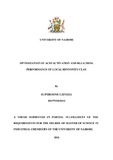| dc.description.abstract | Bentonite clays from Athi River and Thika were activated using sulphuric acid at various
concentrations under reflux, and investigated for their ability to bleach vegetable oil.
Bleaching properties of acid-activated bentonite clays were studied to investigate their
applicability as an alternative to the expensive imported bleaching earth. When the chemical
composition and physical characteristics of the natural and activated clay samples were
analyzed, Athi River bentonite clay was generally found to be more suitable for acid
activation than Thika bentonite clay. For the Athi River bentonite clay, activation at 100 °C
and 2.5 hours with constant stirring were found to be optimum conditions of temperature and
contact time, respectively. Clay/acid ratio was found not to significantly affect the clay
properties. Cation exchange capacity (CEC) was found to decrease with increase in
concentration of acid used in the activation process. Palm oil was used to investigate the
bleaching performance of the activated clay samples. When the oil was bleached at 90 °C for
30 minutes using 4% clay activated with 2 mol/L H2SO4, the bleaching performance
increased up to 98%. The equilibrium data was analysed using Freundlich and Langmuir
adsorption isotherms. Freundlich isotherm model (R2 =0.9247) provided a better fit to the
data than Langmuir isotherm (R2 =0.04181). The heat of adsorption was determined to be 30.881
kJmol-1. This revealed that bleaching of palm oil with activated Athi River bentonite
clay was an exothermic reaction and a physico-chemical process. The kinetics was evaluated
and the rate constant was found to be 0.148 min-1 for this clay which compared well with
0.127 min-1 for Commercial Bleaching Earth. The results from this study revealed that acid activation is an effective method of improving adsorption performance of Athi River
bentonite clay. The activated clay can be used in oil industries for bleaching vegetable oils as it compared well with the commercial bleaching earth. Since bentonite is an abundant natural adsorbent, improving its properties can make a cost effective adsorbent for bleaching vegetable oil. | en_US |

